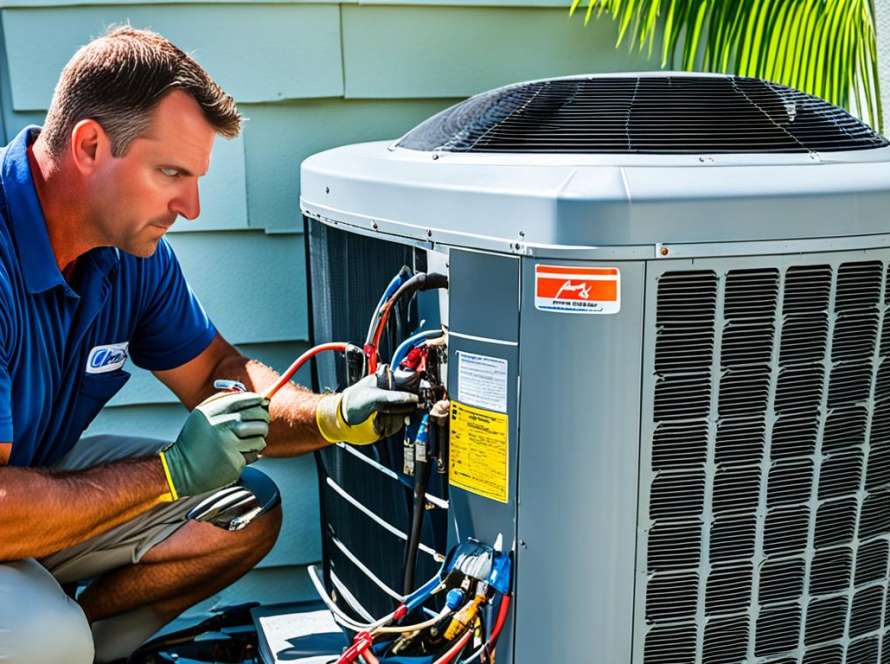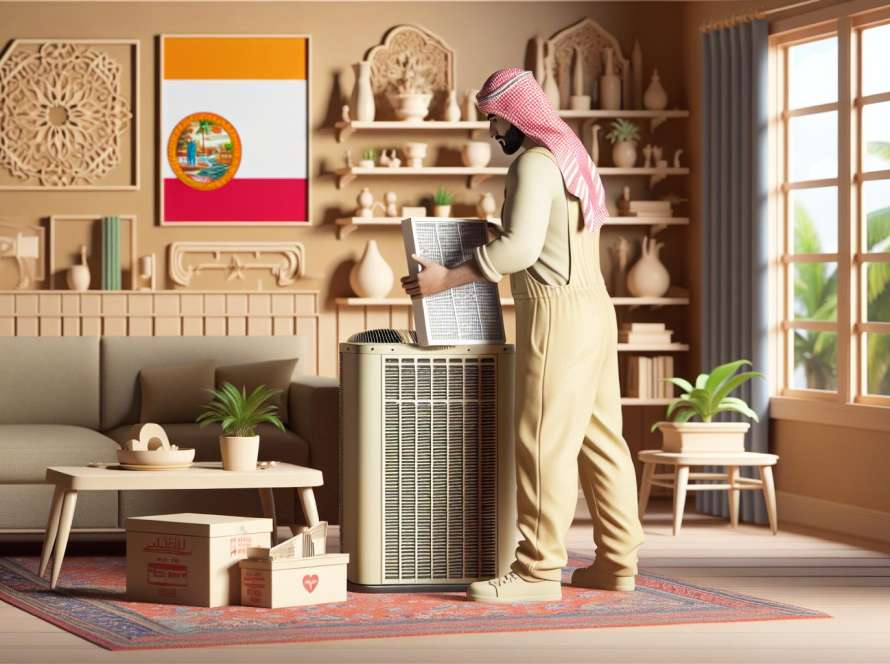So, you’re in Florida, where the heat can be relentless, and your air conditioning unit decides to act up. We’ve all been there, sweating it out while trying to find a quick and affordable solution to get our AC back up and running. In this article, we’ll dive into the world of cost-effective AC repairs specifically tailored to the unique demands of the Florida climate. From common issues to practical tips, we’ve got you covered.
When it comes to keeping cool in the Florida heat, a malfunctioning AC is the last thing we need. That’s why understanding how to address AC problems without breaking the bank is crucial. Our guide will walk you through budget-friendly repair options and preventive maintenance strategies to ensure your AC system stays in top shape, saving you both money and hassle in the long run.
With our expert advice and insider tips, you’ll be equipped to tackle AC repairs in Florida like a pro, without draining your wallet. Stay tuned as we unravel the secrets to cost-effective solutions that will keep you cool and comfortable, no matter how scorching the Florida sun gets.
Common AC Problems in Florida Climate
In Florida, air conditioning systems work tirelessly to combat the relentless heat and humidity. However, this taxing environment can lead to specific issues that are commonly faced by residents. Below, we outline these common AC problems and provide insights into how to address them effectively.
For Beginners: Identifying Basic Troubles
- Clogged Air Filters: One of the most frequent issues, caused by dust and debris buildup.
- Refrigerant Leaks: Loss of refrigerant can hinder cooling efficiency.
- Thermostat Malfunctions: Inaccurate temperature settings can disrupt the AC’s performance.
For Intermediate Users: Addressing Complex Challenges
- Frozen Evaporator Coils: Often a result of poor airflow or refrigerant issues.
- Faulty Capacitors: Capacitors help start the AC unit; malfunction can lead to system failure.
- Dirty Condenser Coils: Accumulated dirt can strain the system and impact cooling.
- Compressor Failures: Critical component breakdown; professional assessment may be necessary.
- Electrical Wiring Problems: Damaged wires can pose safety risks and affect AC operation.
- Uneven Cooling: Issues with ductwork or improper system sizing can lead to uneven temperature distribution.
Maintaining awareness of these common AC problems can help you troubleshoot effectively and ensure your system operates efficiently in the challenging Florida climate. Regular maintenance and timely repairs are key to enjoying cool indoor comfort throughout the year.
Tips for Troubleshooting AC Issues

For Beginners: Getting Started with Basic Maintenance
- Check Thermostat Settings: Ensure the thermostat is set to the desired temperature.
- Inspect Air Filters: Regularly clean or replace air filters to maintain proper airflow.
- Look for Leaks: Check for any visible refrigerant leaks or unusual sounds from the AC unit.
- Clear Debris: Keep the area around the outdoor unit clean from debris or obstructions.
For Intermediate Users: Enhancing Efficiency and Performance
- Regular Coil Cleaning: Clean the condenser coils to improve cooling efficiency.
- Monitor Refrigerant Levels: If there’s a refrigerant leak, contact a professional for repairs.
- Inspect Ductwork: Check for leaks or blockages in the ductwork for optimal airflow.
- Calibrate Thermostat: Ensure the thermostat is calibrated correctly for accurate temperature readings.
- Test Capacitors: Use a multimeter to test capacitors for any faults or malfunctions.
- Check Electrical Components: Inspect wiring and connections for any loose or damaged parts.
- Professional Maintenance: Schedule annual maintenance with a certified HVAC technician.
- Consider Upgrades: Evaluate the age and efficiency of the AC unit for potential upgrades.
| Key Points | Value |
|---|---|
| HVAC Maintenance | Regular maintenance is key to preventing major AC issues. |
| Energy Efficiency | Proper maintenance can improve energy efficiency and reduce utility costs. |
| Professional Help | Consulting HVAC professionals for complex issues is recommended. |
| System Longevity | Addressing problems promptly can extend the lifespan of your AC unit. |
DIY Repair vs. Professional Services
When it comes to addressing air conditioning issues in the Florida climate, the choice between DIY repairs and professional services can be crucial. Let’s explore the different approaches based on your expertise level:
For Beginners: Taking the First Steps
- Inspecting Thermostat Settings: Ensure the thermostat is set to cool and the temperature is lower than the current room temperature.
- Checking Air Filters: Replace or clean dirty filters to maintain proper airflow and efficiency.
- Looking for Leaks: Examine visible pipes or connections for any signs of leaks.
- Clearing Debris: Remove any debris or obstructions around the outdoor unit to prevent airflow blockages.
For Intermediate Users: Enhancing Your AC Maintenance
- Regular Coil Cleaning: Keep the coils clean to improve system efficiency and cooling performance.
- Monitoring Refrigerant Levels: Check refrigerant levels and consider professional help if there are signs of leakage.
- Inspecting Ductwork: Ensure ducts are properly sealed and insulated for optimal airflow.
- Calibrating Thermostats: Verify that the thermostat is accurately reading and responding to temperature changes.
- Testing Capacitors: Check capacitors for signs of wear and consider replacing if necessary.
- Professional Maintenance: Schedule regular professional maintenance to detect and address issues early.
- Consider Upgrades: Evaluate the efficiency of your current system and consider upgrades for improved performance.
- Seeking Professional Help: For complex issues or system malfunctions, it’s best to rely on experienced technicians for accurate diagnosis and repairs.
By understanding the difference between DIY repairs and professional services, you can make informed decisions to keep your AC system running efficiently in the demanding Florida climate.
Budget-Friendly Repair Options
Looking to save some bucks on your AC repairs in the hot Florida climate? We’ve got you covered with some cost-effective options to keep your cool without breaking the bank.
For Beginners: DIY Troubleshooting
- Inspect and clean air filters regularly to ensure efficient airflow.
- Check thermostat settings to ensure they’re accurately reflecting your comfort needs.
- Look for visible leaks around your AC unit that may indicate a problem.
- Clear any debris around the outdoor unit for optimal operation.
For Intermediate Users: Maintenance Tips
- Regularly clean the coils to prevent dust buildup and improve cooling efficiency.
- Monitor refrigerant levels to ensure your system is operating at peak performance.
- Inspect ductwork for any leaks or blockages that could hinder airflow.
- Calibrate thermostats for accurate temperature control.
- Test capacitors for signs of wear and tear that may affect your AC’s performance.
- Consider upgrading to a programmable thermostat for better energy management.
- Schedule professional maintenance at least once a year to keep your system running smoothly.
- Seek professional help for complex issues like compressor problems or refrigerant leaks.
- Opt for energy-efficient upgrades to save on long-term utility costs.
- Explore financing options for larger repairs or replacements to manage expenses effectively.
No matter your expertise level, there are plenty of cost-effective ways to maintain and repair your AC system in Florida. By staying proactive with regular maintenance and addressing issues promptly, you can extend the life of your unit and keep your indoor environment comfortable.
Preventive Maintenance Strategies

For Beginners: Basic Maintenance Tips
- Clean or replace air filters regularly.
- Check and adjust the thermostat settings as needed.
- Ensure proper airflow around the air conditioning unit.
For Intermediate Users: Advanced Maintenance Techniques
- Clean the coils to improve efficiency.
- Monitor refrigerant levels and top up if necessary.
- Upgrade to a programmable thermostat for better control.
- Schedule professional maintenance annually.
- Address compressor issues promptly to prevent further damage.
- Consider energy-efficient upgrades for long-term savings.
| Important Maintenance Tips | Frequency |
|---|---|
| Clean or replace air filters | Every 1-3 months |
| Check and adjust thermostat settings | Seasonally |
| Clean coils | Annually |
| Monitor refrigerant levels | Annually |
| Schedule professional maintenance | Annually |
| Address compressor issues | As needed |
| Upgrade to programmable thermostat and energy-efficient upgrades | As needed |
Conclusion
In Florida’s climate, cost-effective AC repairs are crucial for maintaining a comfortable indoor environment. By implementing preventive maintenance strategies and following basic maintenance tips, we can ensure the longevity and efficiency of our air conditioning systems. From cleaning air filters regularly to upgrading to energy-efficient options, there are various ways to optimize AC performance. Remember to schedule annual professional maintenance and address any compressor issues promptly. By staying proactive and investing in the right upgrades, we can enjoy cool and efficient air conditioning while keeping costs in check. Prioritizing regular maintenance and being mindful of energy consumption will not only extend the lifespan of our AC units but also contribute to a more sustainable and comfortable living environment in the Sunshine State.

